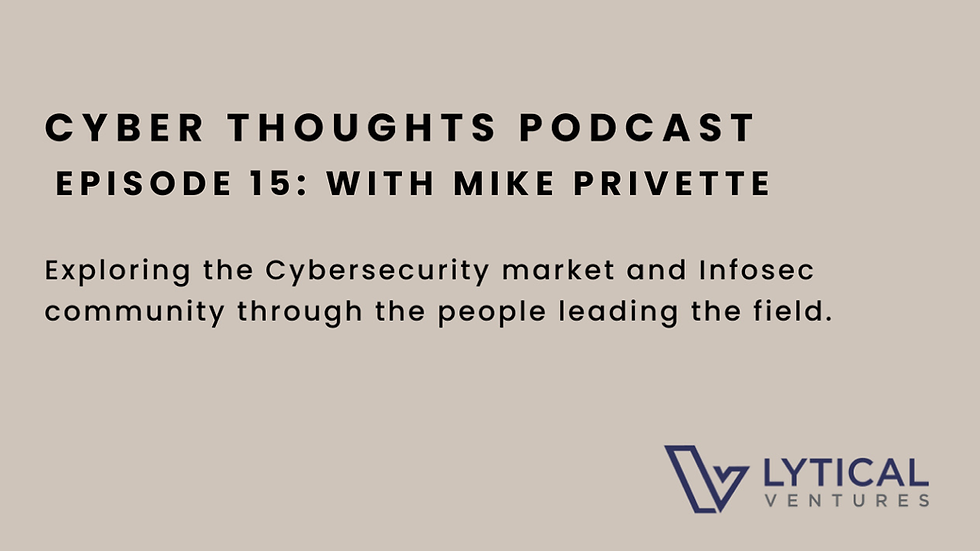DeepSeek Mania! Now 90% off!
- Lytical Ventures
- Feb 5, 2025
- 3 min read
Updated: Feb 6, 2025
Cyber Thoughts Newsletter
FEBRURARY 2025
If the fight between DeepSeek and OpenAI were a boxing movie, then OpenAI would be Drago and DeepSeek would be Rocky. How’s that for a gut punch?
There are a lot of questions about how DeepSeek was created and whether comparing its costs to those of OpenAI is really fair. Adding to that are the questions of what it means to be Open Source. While the model released by DeepSeek is freely available, the exact recipe to create it is not. That means anyone can test the engine, but they can’t try rebuilding their own from scratch to test the actual costs involved. That is not, at least in the traditional sense, truly Open Source.
With all that said, this could be a paradigm shift in the cost of AI models and how we monetize them. Let’s look at that issue.
If, and this is a big if, DeepSeek built its recent models with Nvidia’s lower-performing H800 chips, which are not restricted from export to China, the paradigm has changed.
Materially lowering the cost of making advances will allow more participants (Ex. smart technologists) with heretofore fewer resources the newfound ability to experiment freely, fear failure less, and have a chance at contributing meaningfully to the advancement of the field. Simply put, the rate of advancement should accelerate.
Until now, AI advancement has been a story of haves and have-nots. Countries would be separated into those that could afford access to high-end, high-powered silicon chips and build wildly expensive data centers, and those that could not. Now, companies that may have been forced to be machine learning-based innovation consumers can become innovation creators. The playing field that was heavily tilted toward rich, developed countries is closer to level.
If you believe that the US has the upper hand in political interactions with our rivals based on its early lead in developing machine learning-related technology, it’s time to reconsider. It’s probably not a coincidence that the white paper detailing this incredible cost-related breakthrough came out on the same day as the inauguration of a ‘tariff favoring’ President. Perhaps necessity has once again been the mother of invention.
But all this can only be true ‘if’ the use of H800 chips can be verified, ‘if’ the data set is made available, and ‘if’ the results can be replicated, which doesn’t appear to be happening.
That leaves a lot of room for conspiracy theories and finger-pointing, America’s other great pastime. For now, it appears that while DeepSeek has made a great improvement, and shared it widely, the reports of the death of the US AI industry were greatly exaggerated… Probably.
If you appreciate our content, please follow us on Twitter and LinkedIn, where we valiantly endeavor to separate hype from reality... or at least make the hype more entertaining.
What We're Reading
Here's a curated list of things we found interesting.
Announcing The Stargate Project
The Stargate Project is a new company which intends to invest $500 billion over the next four years building new AI infrastructure for OpenAI in the United States. We will begin deploying $100 billion immediately.
This would have been really big news if DeepSeek hadn’t scuttled it. While this announcement has been in the works for a while, and they don’t yet have all the money identified, this is a big bet on both Energy and AI for the US.
OpenAI PROVES DeepSeek COPIED Them!
A short YouTube showing evidence that DeepSeek used OpenAI to create their R1 model.
This is just funny, in a complete 180 OpenAI has decided that using other peoples data to train your model isn’t OK.
FBI Warned Agents It Believes Phone Logs Hacked Last Year
FBI leaders have warned that they believe hackers who broke into AT&T Inc.’s system last year stole months of their agents’ call and text logs, setting off a race within the bureau to protect the identities of confidential informants…
This is, and we can’t stress this enough, bad.
Transactions
Deals that caught our eye.
Blockchain giant Chainalysis acquires Israeli startup Alterya in $150M deal
This marks Chainalysis' second acquisition of an Israeli company in just one month, following the purchase of Hexagate. Alterya specializes in preventing authorised-push-payment (APP) fraud, focusing on cryptocurrency and real-time payment networks.
Podcasts
What we’re listening to.
Cyber Thoughts Episode 11
In this episode of Cyber Thoughts, Lucas Nelson and Mike Privette of Return on Security dive into their top cybersecurity predictions for 2025. From AI-driven data loss prevention to the rise of personal cyber insurance and the evolving IPO landscape, they break down key trends shaping the industry in the year ahead.
About Lytical
Lytical Ventures is a New York City-based venture firm investing in Corporate Intelligence, comprising cybersecurity, data analytics, and artificial intelligence. Lytical’s professionals have decades of experience in direct investing generally and in Corporate Intelligence specifically.







